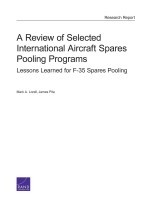| 来源类型 | Research Reports
|
| 规范类型 | 报告
|
| DOI | https://doi.org/10.7249/RR999
|
| ISBN | 9780833090287
|
| 来源ID | RR-999-AF
|
| A Review of Selected International Aircraft Spares Pooling Programs: Lessons Learned for F-35 Spares Pooling |
| Mark A. Lorell; James Pita
|
| 发表日期 | 2016
|
| 出版年 | 2016
|
| 页码 | 54
|
| 语种 | 英语
|
| 结论 |
Lessons Learned from Historical International Spares Pooling Initiatives- The negotiation of international spares pooling programs for common major weapon systems has been attempted many times since the 1960s, but they have proven to be very difficult to implement.
- Major barriers include (1) security of supply and prioritization of scarce spares assets and (2) configuration management and management of innovators versus laggards. These two challenges can be difficult to overcome unless one partner plays a dominant role in the pooling arrangements.
- Conflicting industrial, technological, and economic interests and objectives were a major challenge, especially for all-European programs or programs in which all the partners were roughly of equivalent size and influence.
- The most successful programs were characterized by a single dominant partner that could establish the ground rules and resource allocation priorities, as well as control aircraft configuration. At the same time, successful programs made major efforts to ensure fairness, equality, and transparency for all partners, based on relative contribution and need.
Policy Measures That Facilitate Spares Pooling- Successful programs have mitigated the problem of U.S. export control laws and regulations by retaining U.S. ownership of all spares except when they are installed in ally-owned aircraft.
- All aircraft should conform to U.S. configuration standards, with the proviso that the U.S. Air Force pays for the nonrecurring costs of upgrading the aircraft.
- Incentives for the prime contractor to meet international fleetwide performance metrics and priorities require a splitting out of the smaller foreign fleets with separately calculated metrics so that these fleets are serviced with the same priority as the larger U.S. fleet.
|
| 主题 | Aviation Maintenance
; Fighter Aircraft
; Security Cooperation
; United States Air Force
|
| URL | https://www.rand.org/pubs/research_reports/RR999.html
|
| 来源智库 | RAND Corporation (United States)
|
| 引用统计 |
|
| 资源类型 | 智库出版物
|
| 条目标识符 | http://119.78.100.153/handle/2XGU8XDN/108343
|
推荐引用方式
GB/T 7714 |
Mark A. Lorell,James Pita. A Review of Selected International Aircraft Spares Pooling Programs: Lessons Learned for F-35 Spares Pooling. 2016.
|
|
文件名:
|
x1495316316928.jpg
|
|
格式:
|
JPEG
|

|
文件名:
|
RAND_RR999.pdf
|
|
格式:
|
Adobe PDF
|
除非特别说明,本系统中所有内容都受版权保护,并保留所有权利。